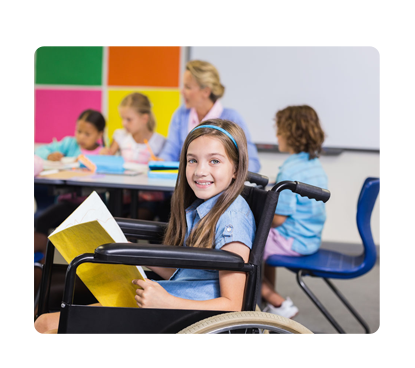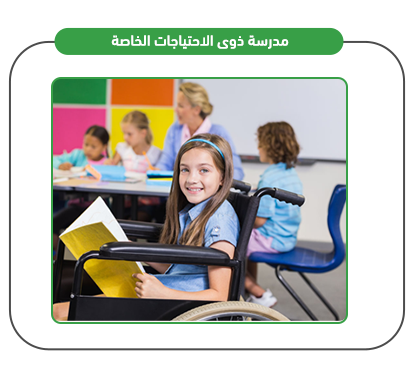The Special Needs School provides a distinguished educational environment focused on meeting each student’s individual needs through innovative educational programs and customized curriculum. The school adopts a comprehensive curriculum that integrates academic and rehabilitative aspects, enabling students to develop their intellectual and social abilities simultaneously. Additionally, the Special Needs School provides specialized support through an integrated team of teachers with experience in dealing with various disabilities. To achieve the best results, educational activities are designed based on modern educational techniques that take into account individual differences and enhance self-confidence and independence. The school also encourages students to participate in social and sports activities, which contributes to their positive integration into society. It is worth noting that through this integrated approach, the school seeks to achieve comprehensive educational goals that include developing life skills and enhancing personal competencies, ensuring every student has the opportunity for academic and social success and advancement.

The Special Needs School project aims to establish a school specializing in the care and rehabilitation of children with special needs. The school includes a group of departments that provide integrated services, with the goal of addressing educational and learning aspects, as well as rehabilitation services for children unable to lead normal lives. To achieve this goal, the project relies on the latest scientific and educational methods, utilizing modern technology to ensure competitive services that enable the school to meet the growing demand for this type of service. Given the importance of investing in the social and educational sectors, both in developed and developing countries, the Special Needs School project stands out as a unique opportunity to enhance communities’ capabilities to meet the special needs of children. Furthermore, the project seeks to develop children’s talents and prepare them for effective integration into society. The school project not only provides basic services but also aims to achieve rewarding investment returns, making it a sustainable model that combines social impact and economic feasibility.<br><br><br>



A learning environment tailored to meet the needs of each student.
Flexible curricula focused on interactive learning.
A dedicated team of teachers and specialists.
Innovative teaching techniques to enhance the learning process.
Individualized care for each student to ensure significant progress.
Providing diverse learning strategies tailored to the diverse needs of students.
Physical and occupational therapy programs to improve motor skills.
A safe and supportive environment to encourage learning and interaction.
Continuous support for families through counseling and guidance.
Focusing on promoting independence and achieving self-reliance.
Organizing training workshops for teachers to develop their skills.
Executive summary
Study project services/products
Market Size Analysis
Risk Assessment
Technical study
Financial study
Organizational and administrative study

The Education Sector in the GCC Countries
Believing in the importance of the education sector and its role in promoting the localization of the national workforce, Mashroo3k for Economic Consultancy and Market Research is pleased to present the following key indicators of the education sector in the Gulf Cooperation Council (GCC) countries, inviting investment in this vital field:
The total number of students in Early Childhood Development (including nurseries and kindergartens) across the GCC reached approximately 851,500 students, according to the latest available statistics.
The number of students enrolled in school education stages across the GCC is estimated at around 9.3 million students (79.4% in the public sector and 20.6% in the private sector).
The number of learners in adult education centers is estimated at 181,247 students.
The number of students enrolled in higher education institutions stands at 2,206,446 students.
The number of early childhood teachers is approximately 50,647.
The number of school education teachers is estimated at around 727,904.
There are 5,806 operational early childhood education institutions.
There are 32,310 operational school education institutions.
Over the past years, GCC governments have actively sought to bridge the gap between education and the labor market by adopting educational curricula that emphasize vocational and technical education and encourage learning through modern technologies and digital platforms. It is also worth noting the increasing investment in education quality across the six countries to produce graduates who meet the private sector’s workforce requirements.
According to the latest statistics:
Saudi Arabia allocates 18.9% of its budget to education.
The UAE allocates 14.8% of its budget to education.
Oman allocates 12.2% of its budget to education.
Bahrain allocates 9.8% of its budget to education.
Kuwait allocates 12.3% of its budget to education.
Qatar allocates 10.5% of its budget to education.
By 2023, the value of the private education market in the GCC is expected to reach USD 26.2 billion.
The Global Education Sector
The global education services market was valued at approximately USD 2,882.52 billion by the end of 2021. Experts project that the market will reach USD 3,191.79 billion by the end of 2022, achieving a compound annual growth rate (CAGR) of 10.7%. Furthermore, by 2026, the market value is expected to rise to USD 4,623.90 billion, reflecting a CAGR of 9.7% over the forecast period.

Investment in the Saudi private education sector grew by 3% in 2016, rising to 15.5% compared to 12.5% in 2015. Investment in the private education sector has increased over the past five years, reaching approximately 10 billion riyals.